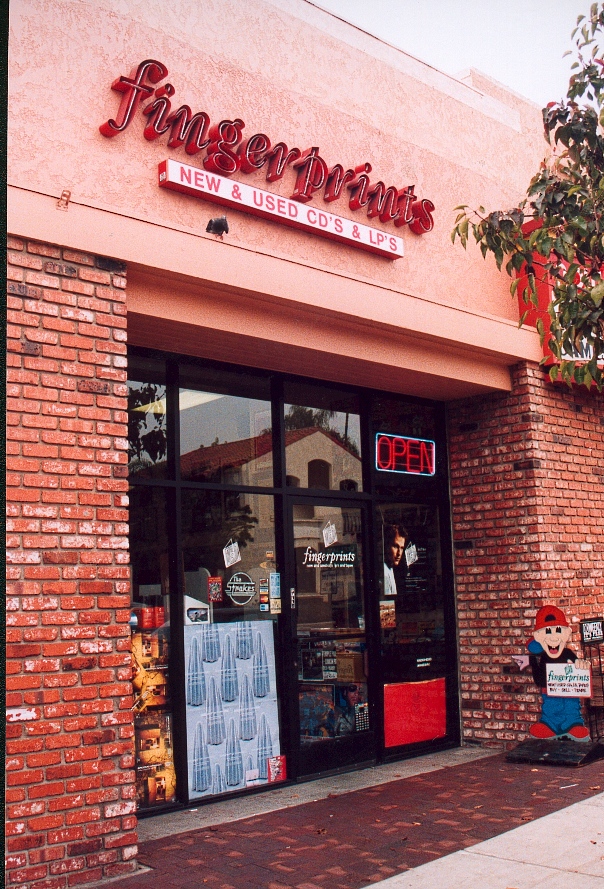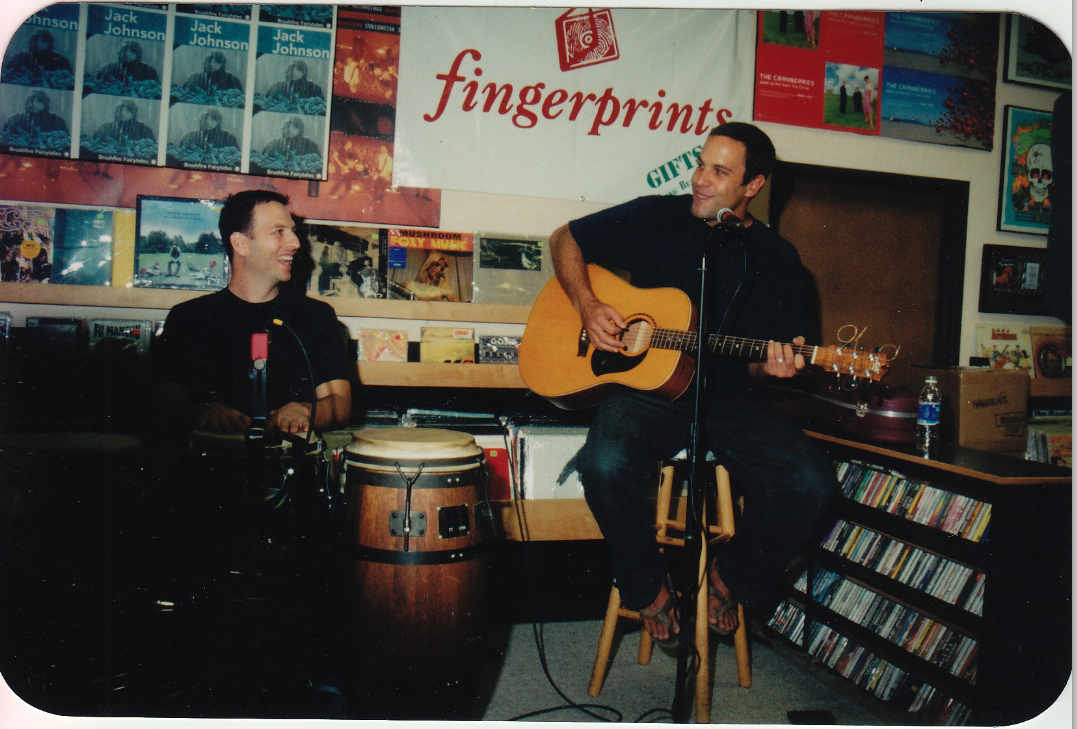Interior of Belmont Shore location (c. 2006). Photo courtesy of Rand Foster.
Rand Foster does not invoke the concept of providence while reviewing the history of his record store Fingerprints—which celebrates its 20th anniversary this week. But if he did, you could hardly blame him. “It was one of those crazy storybook things that shouldn’t have worked but did,” he says.
Aside from Foster’s from-the-cradle love of music, the business end of the story starts not with music but photography, as in the mid 1980s the future entrepreneur had a job in what he calls the “novelty photography business,” working for a man who provided Magic Mountain with those little peephole keychain pictures.
Novelty or no, there was enough demand for the product that Foster formed his own business Novelty or no, there was enough demand for that sort of product that Foster formed his own business (“I would shoot chili cook-offs, car shows, senior proms…”). That business would prove to be one of the two major factors springing from his initial novelty-photography job that fostered his to embark on the Fingerprints venture. The other was his then-future wife, Kelly, whom he met while she was employed by another company in the amusement industry. Kelly’s well-paying job and all-around support would prove essential to the birth of Fingerprints.
But first there was Foster’s entrance into the record-store business, which took place in 1989 when he went to work at Moby Disc in Newport Beach. But for the ambition of a co-worker, who left to open up his own shop, there might be no Fingerprints.
“He would call me from his store and ask me any number of questions,” Foster recalls. “‘How many of this should I bring in?’ ‘He’s trying to trade me this—what do I pay him for it?’ ‘I’ve got an employee problem.’ And every time I would answer his question, he would say, ‘You should really have your own store. You know more about this than I do. Why don’t you have your own store? It’s so easy.'”
Intrigued, Foster began to learn about the business side of the industry and to scout locations. “I made several baby steps, but I had not at any point made any kind of commitment,” he says.
However, his former co-worker—a member of the family that owned Moby Disc—apparently became concerned that in advising Foster he was doing something behind his family’s back and so he spilled the beans to Foster’s boss. Even though those beans were far from cooked, Foster was fired.
“I was like, ‘Well, I had been thinking about it, and now I don’t have any other choice but to actually do it,'” Foster says, laughing. “It really worked out really, really, well in the grand scheme of things, but I was ferociously pissed at the time.”
Foster’s photography business was flexible enough to enable him to schedule work around his effort to open a store, and his wife’s job was well-paying. Otherwise, Foster had little more going for him than a profound love of music and an extensive record collection—a collection that grew tremendously when a friend with tax trouble offered to sell a huge batch of albums that filled gaps in Foster’s less-common holdings.
“I was into all the weird stuff—The Replacements and Dinosaur Jr and weird Australian bands, stuff not anywhere near the mainstream yet,” he says. “And my friend was into all the classic rock stuff. He was like, ‘Hey, do you want to buy my collection?’ And it was every Beatles, every Stones, every Who, every Elton John record. I mean, pick the hundred greatest classic artists, and he had everything. I was like, ‘Yes!’ So most of my money went to that. […] We used credit cards, our savings, my collection, a little bit of family money—$2,000 here, $2,000 there…. I think when all is said and done, we did the whole thing for, like, fifteen thousand bucks and my collection, which is amazing to consider. At one point I had a partner for 15 minutes who was going to give me, like, $5,000 and own 25% of the company. He gave me the initial thousand, and got cold feet and backed out. He’s a good friend of mine still, but it was the best thing that ever could have happened.”
Cold War Kids album-release show in 2008.
Foster got lucky with location when Z Pizza wanted only the front half of an available space in a prime Belmont Shore location. And his luck held concerning his ability to spread a bit of manure.
“The landlord was kind of stressed out, because they didn’t know what to do with the back half,” Foster says. “So we came along and said, ‘We want to do this.’ In retrospect, they took such a huge chance on us. We negotiated everything, agreed to everything, turned in the lease, and then he called me and said, ‘Oh hey, I need a copy of your business plan.’ And I actually had to call a friend of mine who had a travel agency to have him explain to me over the phone what a business plan looked like—this was a Friday [Foster starts to giggle here]—so I could make something up to turn it in to this guy on Monday.”
Foster recounts the three initial goals he had for the store: to have John Wesley Harding play at the store, to get a record award with the store’s name on it, and to not have to close it.
“That was the extent of my long-range planning. Everybody had always said, ‘In businesses, the first year is always the roughest.’ And every stupidly, I was like, ‘Oh, if we get through the first year, we’re home free,'” Foster says. So I mean, really, that was the level of business acumen I brought to it. So that it worked out is a marvel to me.”
Foster says a tremendous advantage during that first year was that it was not requisite that Fingerprints make money, just that it not hemorrhage cash. It didn’t and instead, the store diversified its offerings and became a neighborhood fixture by providing hard-to-find records for local residents. By year two, his wife had quit her job.

Jack Johnson gives an in-store performance in 2001.
So, was his Moby Disc friend right in saying that the record-store thing is easy? “I think it was easy,” Foster says. “It sounds really stupid to say that—I mean, we’ve all worked our asses off; but I think that when you’re doing something you love, that doesn’t seem hard. […] Because when you do something that you love, it doesn’t matter that you’re doing 12-hour days. […] Then it’s really, ‘Wow, people are coming in my house and checking out my stuff, and we’re talking about it.’ […] It’s been a struggle; it’s still a struggle. […] It’s not a great environment [in which] to be a record store these days, economically and technologically. This segment of the business is definitely a struggle. So there’s part of me that’s like, well, every day is worth celebrating.” He laughs. “But fortunately, people show up every day.”
Fittingly, then, Fingerprints 20th anniversary festivities won’t differ greatly from what the stores does all the time–sell great music and host great live shows, starting tonight with a set by Milo Greene on the eve of the release of its debut album and continuing Tuesday night with a show by The Fixx (“One Thing Leads to Another”, “Red Skies”, etc.).
This story is a two-parter—you know, like all those cool vinyl records Fingerprints has on its shelves. Check out the B-side to find out about the store’s recent relocation from Belmont Shore and the future of Long Beach’s flagship record shop.
Fingerprints is a record store and much more located at 420 E. 4th St., LB 90802. For more information, call (562) 433-4996 or go to fingerprintsrecords.com.

